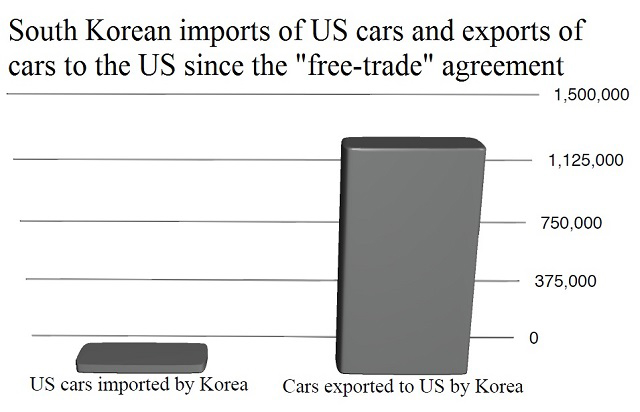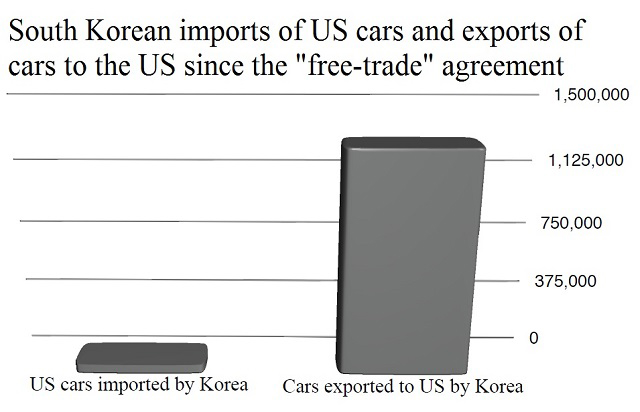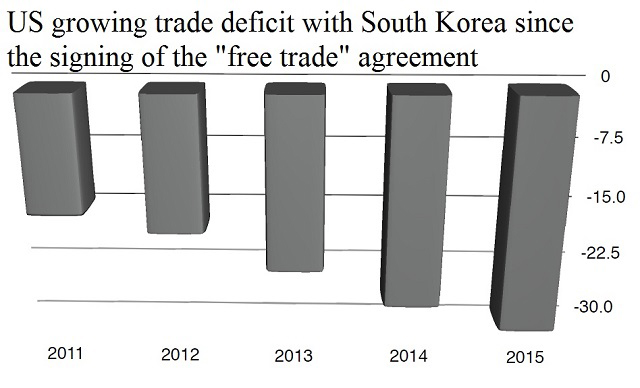
Honest, paywall-free news is rare. Please support our boldly independent journalism with a donation of any size.
Last year, President Obama went to North Carolina to pitch the Trans-Pacific Partnership (TPP). He exhorted folks to understand the “free-trade” deal would “lead to more Made in America exports and more higher-paying American jobs here at home … That means more jobs and higher salaries for the people of North Carolina.”
Writer and philosopher George Santayana said that those who don’t remember history are the first to repeat it. Others opine that history doesn’t exactly repeat itself, but it does rhyme.
In order to find out whether the TPP is great for the US, take a step back to the last major “free-trade” deal. We signed one with South Korea in 2012 — the US-Korea Trade Agreement. Can we find any historical repetition, or at least a few rhyming couplets?
Obama touted the South Korean bill with similar puffery, saying, “Manufacturers of American cars and trucks will have much more access to the Korean market … and we’ll continue to ensure a level playing field for American automakers here at home.”
And the results please?
 (Chart: Courtesy of Jerry Kroth)
(Chart: Courtesy of Jerry Kroth)
South Korea purchased a whopping 49,000 Chevys and Fords from the United States, but exported 1.3 million Kias and Hyundais on the playing field on which Obama is running. And that was three years after the agreement was signed. For every car South Korea imported, they exported 23.
Odds of 23:1 are not even close to level.
As for overall trade, South Korea actually decreased its imports of American goods while it increased its exports.
The trade deficit between South Korea and the US since signing the agreement can be seen in the following chart:
 (Chart: Courtesy of Jerry Kroth)
(Chart: Courtesy of Jerry Kroth)
Obama promised the South Korean trade bill would “support 70,000 American jobs from increased goods exports alone.”
The actual trade deficit with South Korea since the accords were signed more than doubled from $13 billion to $28 billion.
Sorry, Mr. President, but if estimates are true that for every $1 billion trade deficit, 9,000 American jobs are lost, then 252,000 jobs were lost with the signing of this bill, not 70,000 gained.
As for the folks in North Carolina whose support he is seeking to get into another trade deal like the TPP, it kind of makes you wonder if this time, history will be different, or if George Santayana is right after all: If we can’t remember what we did, we’re likely to be doing it again.
It also causes one to puzzle over who President Obama actually represents. It certainly is the not the workers of North Carolina. It isn’t the workers who make cars in Detroit for GM. And it isn’t the 50 percent unemployed Black inner city youth in his hometown of Chicago.
Who could it be?
Speaking against the authoritarian crackdown
In the midst of a nationwide attack on civil liberties, Truthout urgently needs your help.
Journalism is a critical tool in the fight against Trump and his extremist agenda. The right wing knows this — that’s why they’ve taken over many legacy media publications.
But we won’t let truth be replaced by propaganda. As the Trump administration works to silence dissent, please support nonprofit independent journalism. Truthout is almost entirely funded by individual giving, so a one-time or monthly donation goes a long way. Click below to sustain our work.